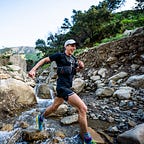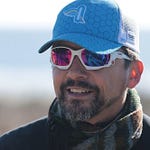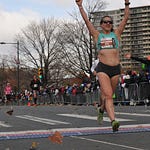Good Sunday morning, friends!
Last Sunday, you heard from my friend Jeanne Torre, an Atlanta-based running, health and wellness coach, who shared her thoughts about how we can approach running and training when we can’t race.
That sparked an idea for me — why not reach out to other running coaches around the country who are now working with runners at all levels, who might be able to help guide us through this period together?
Today, we hear from Wes Judd, a 28-year-old ultramarathoner and running coach based in Chicago, Ill. I came across him after reading this article in last week’s Chicago Tribune, about the challenges runners in the Windy City are facing while we’re all on quarantine.
I hope you enjoy our conversation as much as I did — Wes is a great guy and an insightful coach, with lots of wisdom to share.
Your friend,
— Terrell
P.S.: You can read a transcript of our conversation below, if you’d prefer.
Wes Judd, running an ultramarathon last year.
‘Runners, by definition, are goal-motivated. We need a light at the end of the tunnel to work towards’
Terrell Johnson: I saw the article about you in the Chicago Tribune and was really intrigued by just how you're approaching this whole thing right now. Just what we're all going through.
Wes Judd: Thanks for having me! My running journey started in roughly 2013. I was in college. I played lacrosse in high school, pretty active there. But then in college was relatively sedentary, did a lot of stuff outside of athletics. I was a part of the school radio and newspaper, things like that. But then senior year was feeling a little out of sorts.
I had some friends who went on some runs in the evening, so I just started joining them and I became a hobby jogger you could say, going on easy runs at night. Then for a couple of years after graduating, which was I graduated in 2013, I moved from city to city on my own from jobs and internships and things like that. Didn't have a car, wasn't making a ton of money, so I wasn't joining a gym.
The running hobby just was like a snowball that was rolling downhill and collecting a kind of weight and significance in my life. I moved to Denver at one point and fell into a trail running community there. I discovered what ultra running was and read Born to Run. I think that's a pretty common story for young ultra runners. Yeah. So I just kind of fell down the rabbit hole and I ran recreationally for about three years before I ever raced.
It was just a hobby. It was for myself. I really enjoyed it. But the thing is I always, from the start wanted to be an ultra runner. That was kind of just the community I fell into. I wasn't extremely fast, like I wasn't a mile run or anything like that. I just liked doing the long distances. So I was always going to be an ultra runner.
But yeah, so my eyes at that point were kind of open to, I guess you could say my potential and also how to train. I didn't really know what I was doing, just running every day and hoping that I get fitter and fitter. So it was at that point that things got a little more serious, I guess. I started working with a coach and it became a bigger part of my life.
I mean it's been a really natural progression of just a hobby that I like and that I've developed more interest in and invested more time in. Here I am, like seven years later, and I'm still just as passionate as I was day one. About a year ago I started working with runners as well, just as kind of a natural extension — not helping people win the Olympic trials or anything like that, but just the recreational runners who don't really know where to go or how to start.
Terrell Johnson: Oh that's really good because I was going to ask who is your running coach and how you got into the coaching. Did you just find yourself almost naturally giving people a helping hand? It just made sense to become a coach?
Wes Judd: That's exactly right. I had a few friends who reached out, family members, things like that. My sister ran her first marathon in 2017 and I coached her through that and really liked that experience. For a day job I'm in financial planning — so I really like sitting across the table from someone else, hearing about their goals, their life circumstances, the time, the risk tolerance, etc., and kind of crafting a tailored plan.
So it's really natural extension to just do that in running as well. It's not as if I'm out at the track every night with a whistle — [it’s] all building plans online. But it's been a big part and a really rewarding part of my life for a while.
Terrell Johnson: My first question is sort of going to be, so what goals did you have coming into the season? Because I know for folks that have read your article, it opens with you and sort of like we're all coming into the spring here and this is really when the time running really begins to hit its stride for the year. You have all these big races that are coming up. Now, none of us can do any of those things, right?
Wes Judd: Yeah.
Terrell Johnson: How have you been handling that?
Wes Judd: That's the million dollar question. Personally, for me, speaking from my experience first. I completely lucked out for two reasons: one, I already for a long time have had a goal that I wanted to accomplish that had nothing to do with the race. That was this FKT (fastest known time) on the [Chicago] lakefront path. I run that every single day, more or less.
From day one I thought, there's got to be a record here and if there is, I want to investigate it. Once I figured out what it was and that it was kind of achievable, it was always a goal in the back of my head. So I've been thinking for a year now. If there's ever a lull in my calendar, this is what I'm going to do. So I was fortunate in that sense that I had this goal that had nothing to do with the race.
I was particularly lucky that I just happened to pick the weekend to do it before the lakefront trail closed. So I think an issue that people are dealing with now is, a lot of the places I like to run are just closed or they feel unsafe going there. I chose the weekend to do it right before the lakefront trail was closed. So for me in particular, the stars sort of aligned.
In terms of other folks and athletes I'm working with, it's a tough situation. Runners by definition are goal-motivated. We need a light at the end of the tunnel to work towards. So I think this period is really forcing a lot of runners, at least the few athletes that I work with, to re-evaluate their relationship with running. Why are they running? Has it always been for the next race?
Has it always been for, I don't know to put it crudely, the Instagram likes? What are they really training for? Do they like getting out there every day? Because right now the only thing that's motivating them to get out there every day, is the love to get out there every day. In fact, they have to love it so much, that they put themselves maybe at a little bit of risk right now by going outside.
I mean I don't think any runners ever faced a position like this. I think the athletes that I'm working with, I've framed it in a couple of ways.
We can rest and reset — that's the obvious one. You can take a step back, which is perfectly normal. You can focus on other things in your life. You can give your body a break. You can maybe start some PT work that you've been neglecting. Maybe start a meditation practice.
Just sort of take that time that you've been running and focus on something else. I find a lot of athletes and myself in particular like, yeah — that sounds great. I want to keep running.

‘We have all the time in the world... you don't necessarily need to be peaking for a race.’
So how can I keep running? I think this is a good time — if you can train safely and if you feel comfortable training on the outside — to focus on speed work. Speed work kind of takes a back seat to tailoring exactly what you're going to do for the race.
If you're training for a marathon you don't necessarily need 5K, 10K speed, but I've found that whether you're back of the pack or front of the pack or ultra marathon or mile runner, that sort of 5k, 10K speed is really translatable. But [normally] there's not a lot of time to work on it. So I'm working with a lot of runners, this is a great time. Let's set aside big long runs and things like that and just kind of really focus on speed.
I have some runners though too, who it's on their bucket list to put together a big week. An 80-mile training week, a 100-mile training week — and now's the time. We have all the time in the world. We have the time to run. We have the time to rest and recover. You don't necessarily need to be peaking for a race. So if we kind of beat you up so to speak, it's not as if you're going to compromise your performance in the marathon.
So building volume in is nice. Then I have some athletes who just want to challenge themselves. Set up PR. Even if it's not in a race, they just want to get out there, try to run a 10K as fast as they can. There are a lot of virtual runs too, which adds a little bit more structure and purpose I guess you could say to their attempt. So it really runs the gamut. I don't think there's one right way to be a runner right now.
Terrell Johnson: That's a great point. I've just noticed, just in my own email inbox, looking around online, it seems like the number of virtual runs has just exploded right now. I mean it's like popcorn.
Wes Judd: It's huge. Absolutely. Some runners are... they have more opportunities to quote-unquote “race” now than they did even if there were all the 5Ks and 10Ks in the world. Just because there was a virtual race every single weekend.
Terrell Johnson: Yeah, that's really interesting. It is interesting just the creativity that people are coming up with. I mean, just the things I'm seeing on line what people are doing. Whether it's going to the top of their building, if they live in the large city and running just around the rooftop.
Wes Judd: That's right.
I think people, runners, it's like water. It's a river, it needs to flow and runners need to run and challenge themselves. Whether that's in a big city marathon or doing 120 laps around their building, they're going to find something to do. You know?
Terrell Johnson: Yes. What do you hear from other people in the running community right now. In terms of, I mean, because everybody sort of wants to know, and this may be unfair to ask you this because there's probably no way you can know the answer to it — but do you have any sort of sense of when people think things will reopen up or when we can get back to some semblance of normal?
Wes Judd: Yeah, I wish I knew the answer. I have a very hard time believing that people are going to feel comfortable at a massive city marathon, which is to say shoulder to shoulder with 10,000 to 20,000 people unless there is a vaccine. I don't know, hopefully I'm wrong. Maybe I'm wrong. But I can't imagine people are going to feel great about jamming into the Chicago Marathon corral with a person a foot in front of them and behind them — unless there's a vaccine.
Who knows when that's going to happen. I do hope and I think trail races, smaller 10Ks, things of that nature will start to pop up maybe in the fall. Maybe next year.
It's a little unsettling because for myself and athletes I work with, I think we could comfortably plan out the next three to four months and stay motivated there. This is a good block to focus on, like I said, speed or volume or set a challenge. But then after three or four months it's, what do you do? Do you just do it again?
Terrell Johnson: Excellent question.
Wes Judd: Yeah. So I honestly, I obviously don't know the answer to that. But I cannot imagine that everyone is going to feel comfortable going back to a big city marathon unless there's immunity. By everything I've read, that will probably take at least a year.
Terrell Johnson: Yeah. You keep hearing that number thrown out 12 to 18 months. That's probably the best case. That's a pretty aggressive time table.
Wes Judd: Yeah, it is. It is. In the grand scheme of things, running is not very important right now. But it means a lot, to a lot of people and it's something we care about. So it's a question worth asking and thinking about.
Terrell Johnson: Yeah, definitely. My last couple of questions are like, what do you recommend to somebody that you work with or somebody who's just a really passionate recreational runner? What I hear from the folks who write into the newsletter a lot is, they're dealing with sort of a loss of focus and there's sort of that, they use these races as, just like you mentioned earlier, there are goals to shoot for.
I think a lot of them feel a sense of loss and a sense of sadness about that. What do you tell people, if you're talking to somebody?
Wes Judd: I mean, this is much easier said than done. That is my massive caveat. But it's all a matter really of perspective. In the past runners look at their races as their motivating factor. It is sort of what guides them day to day. It's what's in the back of their head and it's where they place their value. I think it's just a matter of shifting that value, trying to find another reason to run, which again, much easier said than done.
Races are so fun and you get celebrated for finishing them and you get all the Instagram likes and you get a medal. So it's easy for that to be the motivating factor, the light at the end of the tunnel. Right now you really just have to kind of shift your perspective and celebrate yourself and celebrate things that aren't races. So that could be consistency. I think that is the most important thing.
‘Give yourself some freedom... to feel that sense of loss, because we've all lost our goals as runners.’
So, maybe set a goal to hit 25 miles a week or whatever your number that's just slightly challenging for you, four weeks in a row. That is a goal in and of itself. Then you can log it all on Strava and at the end of the week you just see the perfect 25, 25, 25, 25 that's a nice aesthetic little thing you can look at and celebrate yourself. Celebrate consistency.
But a lot of times people find it hard to really hit that gear, that next gear of intensity that's required to set a PR when you're all by yourself. So I think it's a combination of, like I said, shifting your perspective but also giving yourself patience and grace. It's okay to feel awkward and out of place and unsure of what to do and just knowing that it's okay to feel that way.
Give yourself some freedom to feel that way and then once you kind of feel that sense of loss, because we've all lost our goals as runners for the summer and fall. Then just kind of re-calibrating what you're valuing. Maybe just setting a challenge as we talked about. Whether that's a virtual run. Whether that's climbing 10,000 feet in a week. Whether that's running more miles in a week than you ever have.
Whether that's putting together two workouts a week for a month, integrating speed work in a very consistent way. Just instead of having a race be the goal, it sometimes literally requires writing down new goals, put it on paper, here's what I'm going to do.
‘At the end of the day, this is not going to be wasted training’
But at the end of the day this is not going to be wasted training. All the hay is going into the barn and it's going to stay there. You're just going to be that much better and that much fitter for it when we come out the other side.
If you take this time to just be really sedentary, and I don't want to say throw a pity party. But if you really, if you really decide to be inactive for this entire quarantine — that's a hole you're going to have to dig yourself out of on the other side.
So I don't want runners I work with and I don't really advise anyone to be peaking, to be getting in the best shape of their life. I think maintenance fitness, so to speak, is essential right now if you're a long-term lifelong runner. This is just more opportunity to keep laying the groundwork to keep laying the bricks.
Terrell Johnson: How are you mentally approaching your own running right now?
Wes Judd: I kind of had a shift a few years ago where I really, really started enjoying the process of training. I think for a long time I think I deluded myself into thinking I was a process-oriented runner, but I really was just going from race to race. About a year ago I worked with a really great coach. His name is David Roche and he helped me appreciate training for the sake of training.
I really do like racing, but for the longest time I was training just to race. So this opportunity to train without any race on the calendar is honestly a gift. It is something that I'm really happy about. That I can train and if I have a little niggle pop up, I can take some time off. If I get exhausted, I can take some time off. I don't need to string together what I think is a perfect eight weeks of training right before a race.
I can go with the flow and I can just sort of train. That honestly to me, that sounds like a lot of fun. So I'm in the fortunate position where that doesn't really upset me, it's just not having a race on the calendar. I'm excited about that.
So personally I'm trying to practice what I preach, everything I just preached to you and use this as an opportunity to put a lot of hay in the barn. To really just kind of train and not have the pressure of a race hanging over my head.
I don't have to push through it, just because I feel like I need to hit 80 miles that week or whatever. I can just go with the flow. So that's kind of where I'm at. We'll see if that motivation is still there in four months and there's still no race on the calendar. But I'm just trying to take it week by week. Yeah.
Terrell Johnson: I think that's an excellent place to stop. I actually got in touch with David Roche, [and] I'm going to interview him at some point in the next week.
Wes Judd: Wonderful@ He's a guru of running. It's incredible. Both as a person and as a resource for or training. It's just, he's an amazing person.
Terrell Johnson: I read his book last year. He and Megan's book. So I was blown away by it. As a closing question, can you name any resources that you really recommend for runners in general or runners right now?
Wes Judd: David and Megan Roche’s book, The Happy Runner, really helped me and I work with David so I get a little dose of that every single day. But his book really helps much more clearly articulates and help frame everything that you and I just talked about, which is why you're running.
For instance, the book, it's, I don't know, 300 page book and sizable book. It's only in the last half that he talks about training. The first half is all about you as a person, your relationship with running, your relationship with food and sleep and recovery. The intrinsic motivation.
The extrinsic motivation of running. I think, boy, if there's ever an opportunity for runners to have to have those conversations with themselves, now is the time. I cannot think of a better resource than The Happy Runner to really help you start that conversation with yourself. They're both really good writers, really funny writers.
A race discount

Obviously, we don’t yet know the fate of the many, many races that have been postponed or cancelled this year. The organizers of the Rock ‘n’ Roll San Jose Half Marathon, however, sent us a special discount this week, and I wanted to pass it along to you.
Rock ‘n’ Roll San Jose Half Marathon in San Jose, Calif., on Sunday, Oct. 4, 2020 — save $10 with the discount code HMNRNRSJ
If you’re unable to run the race for any reason, you can defer it until the next year (but it will cost a $45 deferral fee).
Again, we may not know the fate of this race until later this year; but I wanted to pass it along just in case it does run this year.
— Terrell












